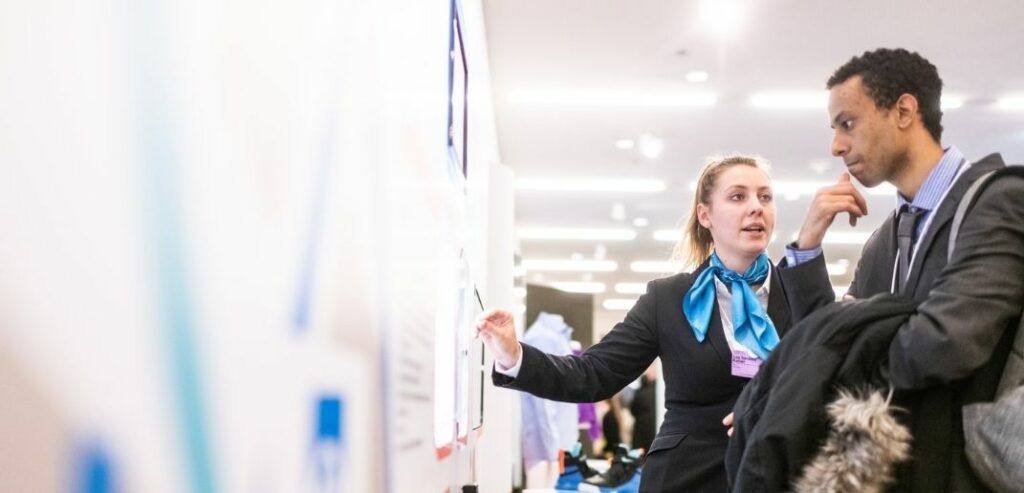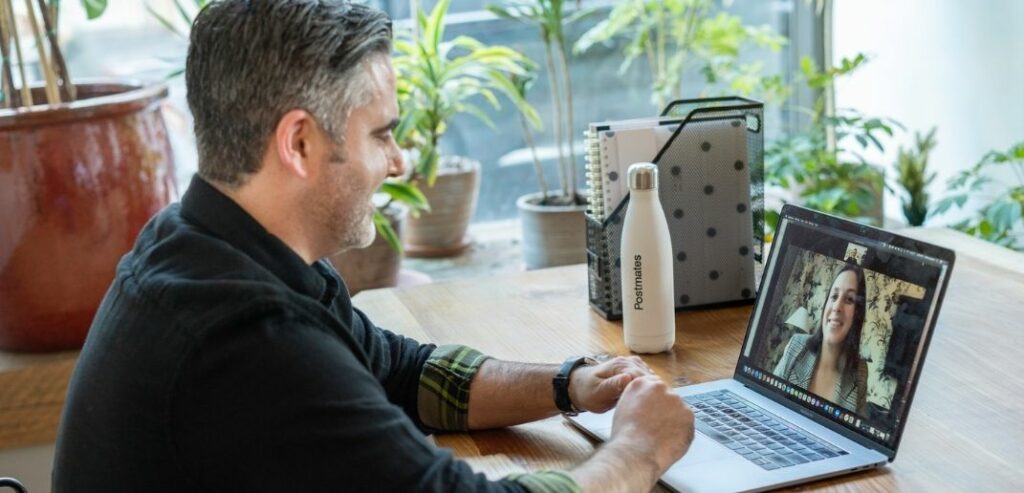
Career days after Covid: changes and opportunities
The profound change marked by Covid-19 in the world of work has inexorably – and inevitably – also affected career days. Career days are those days dedicated to job-hunting in which the HR staff of companies carry out live research and selection of personnel and meet aspiring candidates. Sometimes for positions that are already open, sometimes to ‘collect CVs’ for new opportunities.
With anti-contact measures, red and orange zones and, therefore, severely restricted travel, these recruiting events have also experienced a virtual dimension that has changed the game.
But what will remain of the career day after Covid? How will it change? Will it only be virtual, will it be physical or will it be a hybrid like other events that do not necessarily have to do with work?
We try to take stock of the situation in this article. Starting with the definition of a career day, we look at the different aspects of a virtual career day, how the different management methods can be “mixed” and also how a company can organise it virtually and independently thanks to our ATS software.
What is a career day
A career day is a real recruiting event, also known as a job fair, usually organised by third-party companies, which gives companies that want to look around a chance to meet aspiring candidates face-to-face. Usually young people, because career days are held at universities, but often people with previous professional experience who want to change jobs or sectors also attend.

On the other hand, the opportunity is great: you can meet the recruiters live, ask questions and get immediate answers as well as understand how the selection process will work.
Companies usually have one or more stands – depending on the needs – where you can meet the participants, view their CVs, ask questions to aspiring candidates, etc. If the space allows it, this can be a good opportunity to meet the recruiters in person. If space allows, interviews can also be held on this occasion, perhaps on a confidential basis and for a longer period.
During the day, there may also be various speeches and opportunities for companies to present themselves to the public, debates on a specific sector or the professional figures needed, and much more. In short, a real day dedicated to work and attended by many interested parties.
What is a virtual career day?
Because of the pandemic, in 2020 and also in 2021, virtual career days will be on the increase. They are job fairs, but they are not held in a university, but online, on a platform that actually tries to recreate the conditions of a face-to-face meeting.
The virtual career day or virtual career fair is therefore very similar to the traditional job fair. This mode was already known before the pandemic, but it is with it that it has experienced a real rise. The most important fact is that, since there is no physical travel or stands to organise, it saves companies a lot of money, time and resources.
Career days in 2021
As we have said, the pandemic has led to the spread of virtual career days, even if, in the year we are now living, we hope that there will be a resumption of events in presence as well.
Despite the crisis, companies – although not all of them – have continued to search for talent and to think in perspective in order to have the best resources for the future but also to deal with the current situation. And they have done so virtually.
Before the pandemic, this happened only on a few occasions. The Northrup Grumman Corporation, a US aerospace company, for example, used virtual career days only to intercept people at college. It had the opportunity to talk to students already, but it did not call them in or send recruiters to campuses across the country. From being an option, the virtual career day became a necessity, which meant that the selection process did not stop and consequently neither did companies.
This has also highlighted several advantages of virtual career days. But what will happen after the pandemic? Will they stay or not? Probably yes, and this is because making selection online has its advantages and can be a useful form of recruiting (especially for those who live far away or for international selections, for example).
The advantages of virtual career days
Let’s see what the advantages of virtual career days are and how they differ from physical events.
The virtual career day is safer
Among other things, the pandemic has made us more aware of the importance of security. That’s why in particularly critical moments, a virtual fair may be the most suitable way: there are fewer health risks, in fact practically none, and those who attend don’t have to worry about anything, neither about the journey nor about how they will feel inside the planned location.
People participating in the virtual career day, moreover, can book themselves in and wait in a virtual queue without having to do so physically by keeping their distance. They will cheat the wait by sitting at their desk or on the couch, looking at their notes, the position they are applying for and perhaps sipping a coffee. Of course, they won’t have the opportunity to compare themselves personally with the other participants, it has to be said, but they will certainly be more concentrated.
Attendance is higher and access is “easier”.
Not everyone is able to participate in career days: some live too far away, others do not have the possibility to travel, others still do not have the time to dedicate to the meeting and are therefore forced to give up.

With the virtual mode, this does not happen because – and this is probably one of the greatest benefits – events of this kind cancel space and time limits at a stroke and allow more global participation. Candidates ‘only’ need a stable Internet connection and a device. Ideally a computer, but you can also connect with a tablet or smartphone. In any case, this makes the recruitment process much smoother.
Lower cost
Virtual events are less expensive than face-to-face events, by necessity. You don’t have to rent a location or book it months in advance and you don’t have to worry about organising all the stands in the same area to avoid having to rent other rooms.
You don’t have to worry about providing a reception service, managing the entrance of participants or communicating the information needed to reach the event venue.
There is also no need to worry about parking or traffic. In short, virtual career days are easier to organise and less expensive. In addition, all the expenses related to the equipment needed for the stands, for producing brochures, information material, badges, etc. are reduced.
Can be organised at short notice
Since you do not have to book the venue, a virtual career day can be organised even a week or days in advance, especially if you have a good database of candidates.
In addition, you can easily decide to organise themed career days – e.g. for graduates in scientific subjects or dedicated to companies in the engineering sector – which can come from anywhere.
Personalised experiences can be created
Linked to the above, personalised experiences can be created. Without spending on printing, postage, marketing, each company can work on its own virtual stand to attract a certain type of student and invite them to participate through ad-hoc social content.
In addition, branded waiting rooms can be created to provide information about the company, advice and anything else that will make that moment not only more pleasant but also more profitable.
These are all things that would be difficult to do in person or that would cost more anyway.
Allows for greater efficiency
If it is true that a live meeting is difficult to replace, it is also true that virtual fairs allow greater efficiency: employers can in fact talk to aspiring candidates in private chat rooms or through one-to-one video interviews, something that can only happen in a career day if there are ad hoc rooms.

In addition, you can better manage the time to devote to each candidate and make sure that there is no interruption at that moment.
You can measure results in real time
Some virtual trade fairs provide real-time data on how many attendees there are, the number of booth interactions and even give you the option of transcribing chats, as well as creating online satisfaction surveys and sharing them with the company immediately afterwards.
Therefore, the measurement of ROI is almost immediate and allows the company to make its evaluations after a short time and understand whether to consider the virtual career day a strategic channel for its recruiting.
Virtual meetings after the pandemic
So far we have outlined the main advantages, but what will remain of virtual career days and virtual meetings in general, including career days, after the pandemic? Certainly enough. Indeed, it is very likely that working remotely and virtual career days will continue to exist and be preferred in certain contexts. Admittedly, less intensively than during the more difficult times of Covid-19, but if smart working will remain to meet the needs of workers who live far from offices, the same may be true for job fairs.
If a company is looking for staff to work remotely, it is not essential to ask them to travel as far as Milan or Rome – to give a few examples – to have an interview! This period has shown us that it is possible to make selection at a distance. Of course, during the onboarding phase, it will be possible to organise meetings to get to know each other and train, but in the meantime it is important not to let any talent get away.
In addition, you can opt for virtual career days when you need to make massive recruitments in different locations in Italy or when you are looking for interns and want to start with introductory interviews. In addition, virtual career days fit in well with the tendency of some companies to switch to flexible workspaces, reducing costs and meeting the needs of workers while guaranteeing greater security.
Without forgetting that one of the positive aspects of this very critical period is the strong digitalisation that has involved people and that they are hardly willing to give up. On the contrary. The virtual career day will meet those who are unable to travel, those who cannot and those who have realised that technology saves time and provides immediate answers.
Recruiting and Employer Branding in career days
Moreover, we must not forget a fundamental aspect of the career day: it was created to recruit personnel, but also and above all for Employer Branding which, as we know, especially in this delicate period, is increasingly strategic.
Implementing Employer Branding strategies even when you are not actively searching is not only important, but crucial. This is because it helps, should a position be opened up at a later date, to find talented people more easily, and ensures that a company continues to be attractive and remains so, especially in the eyes of younger people.
A career day, whether virtual or live, is an important part of this strategy because it means continuing to build the company’s reputation, associating it with events where it is trying to boost the economy and help people find work.
In addition, taking part in a career day means giving your brand visibility, being present in all communication before the event, during and after it. And this is certainly a panacea for making yourself known to candidates but also for your Google ranking.
Managing career days and HR events with In-recruiting
In addition to participating in career days organised by others, why not create and manage your own career day or HR event?
With In-recruiting you can do this in a practical and immediate way. In fact, our ATS has an event module that allows you not only to create the event online, to set up the event details, but also to manage it with all the essential information for candidates.
All this in an organised, personalised and interactive way: you can manage the various interventions, personalise communication with participants, even create customised registration forms (and thus improve the candidate journey) and much more.
These are just some of the benefits of the Events module.
Like to try it? Request a demo.

Giornalista, content strategist e formatrice
Siciliana trapiantata a Milano, città che ama molto come la sua terra. Giornalista, SEO copywriter, formatrice e amante del live tweeting, scrive per varie testate e blog aziendali di lavoro, risorse umane e tanto altro.
Ha scritto nel 2020 il suo primo libro “Scrivere per informare” insieme a Riccardo Esposito, edito da Flacowski e nel 2021 altri due: “L’impresa come media” e “Content marketing per eventi“.
Ama il mare, la bici, la pizza, i libri, le chiacchiere all’aperto.